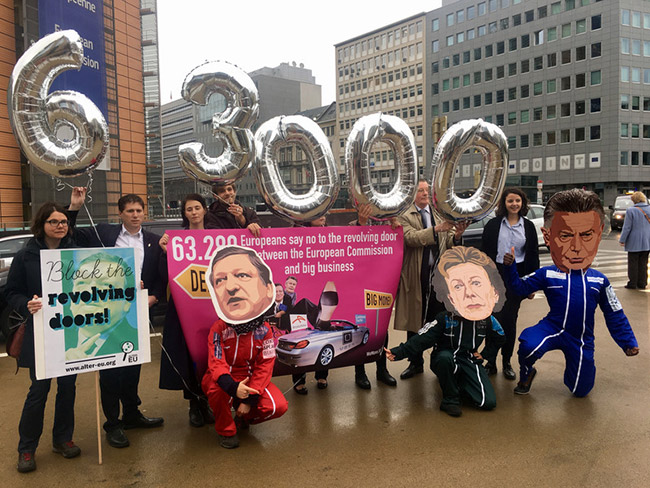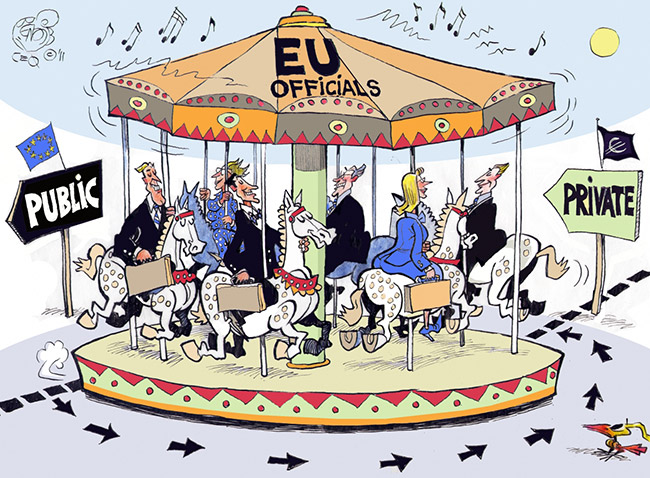6 April 2017, by Margarida Silva, Corporate Europe Observatory.

When discussing corruption we often just imagine shady scenarios where money changes hands. However, public scandals like that involving former President Barroso have raised people’s attention to the threat of conflicts of interest created by revolving doors.
European Union institutions in particular have been under the spotlight since last June when Goldman Sachs International announced that former President of the Commission Barroso was to become its new chairman and adviser. A wave of criticism followed, from heads of state, to employees of the EU institutions and citizens at large. The scandal reignited discussions in the EU of the revolving doors phenomenon; that is the transition of public officials from public office to private organisations and, conversely, the transition of corporate lobbyists and other employees from private organisations to public bodies overseeing their previous industry.
Such professional moves create a set of threats to the integrity and independence of policy-making. Above all, they create biases, because when public officials take up a role in the private sector they carry with them insider know-how, a contact network and a reputation that can open many doors. There is a real threat of creating an unfair playing field benefiting those that actively seek to recruit through the revolving door. Even while in office, public officials might retain biases and unfairly benefit private interests because of their previous jobs or due to the expectation of future ones.

Barroso’s new role created a lot of commotion, quite understandably, as Goldman Sachs International has a keen interest in influencing EU policy and Barroso had led the Commission throughout the aftermath of the financial crisis, a period when he oversaw a flurry of discussions and proposals for new financial regulation. Goldman Sachs had and has a direct interest in these proposals, as correspondence between the bank and the former President, released under Access to Documents requests, revealed. It’s not hard to understand why former President Barroso would be such a great recruit for the bank.
But the problem extends far beyond him and, indeed, far beyond the Commission. The RevolvingDoorWatch (RDW) project aims to detail revolving doors cases with potential or actual conflicts of interest across EU institutions. Over almost six years we have observed a string of transitions and found, for instance, that one in three ex-commissioners from the Barroso II mandate (2009-2014) accepted roles in companies or other organisations linked to big business within just 18 months of leaving office. We also saw how ex-MEPs leave office directly for lobbying consultancies, a trend confirmed by Transparency International EU’s recent report showing that 30 per cent of the 161 MEPs that left politics after the 2014 elections are now working for an organisation in the EU lobby register.
Rules put in place vary widely from institution to institution, but the RDW project allows us to see that there is one unifying line between them – they are too weak, full of loopholes and often poorly enforced.
The UN Convention against Corruption provides a framework that requires state parties to handle conflicts of interest. In particular, Article 12 foresees that each state party should impose restrictions on private sector employment of public officials and vice-versa “where such activities or employment relate directly to the functions held or supervised by those public officials during their tenure” for a “reasonable period of time”.
While helpful, these must be seen as bare “minimum standards”, which even the Code of Conduct for Members of the European Parliament does not match. EU institutions should implement stricter rules. Already in the 2014 EU Anti-Corruption report a main recommendation was for the EU to, “Ensure centralisation of data on detected corrupt practices and patterns, including conflicts of interests and revolving door practices”. But, more than two years on we are nowhere near that.
Ways of preventing the risks associated with revolving doors and other potential conflicts of interest will be discussed under the current UNCAC review cycle, but unfortunately the EU, though a party, has yet to indicate its readiness to be reviewed. The EU should lead on such issues, let’s hope it won’t take more scandals to get them to move forward.
About the author
Margarida Silva is a researcher and campaigner focusing on revolving doors and lobbying transparency at the Corporate Europe Observatory.




